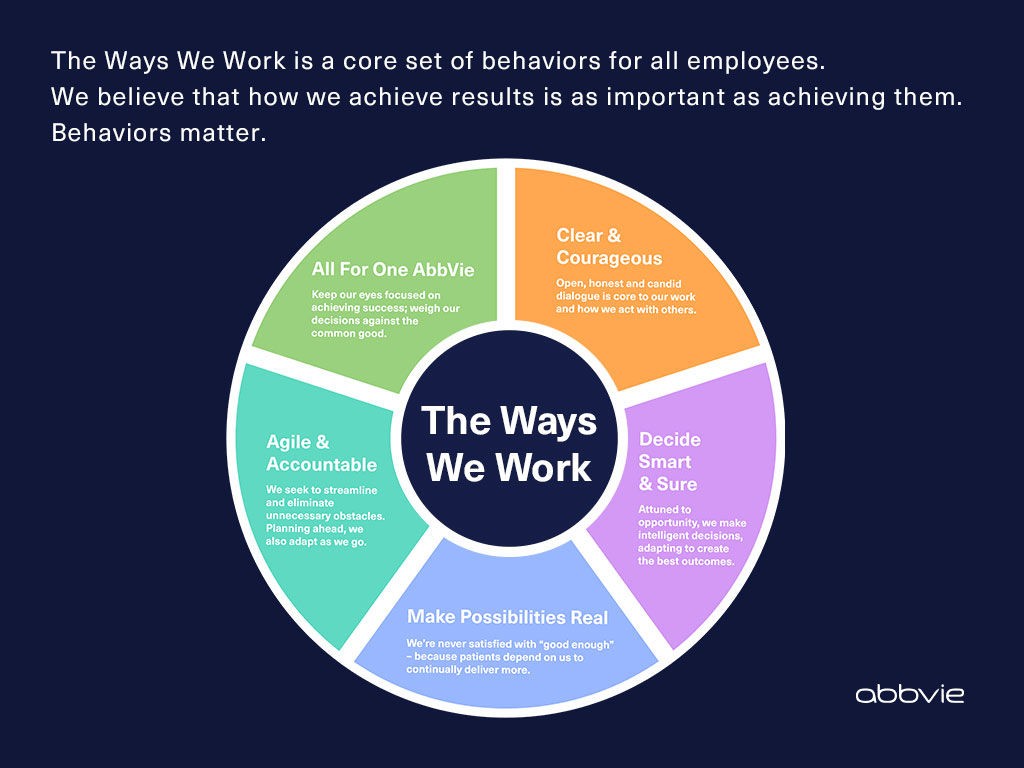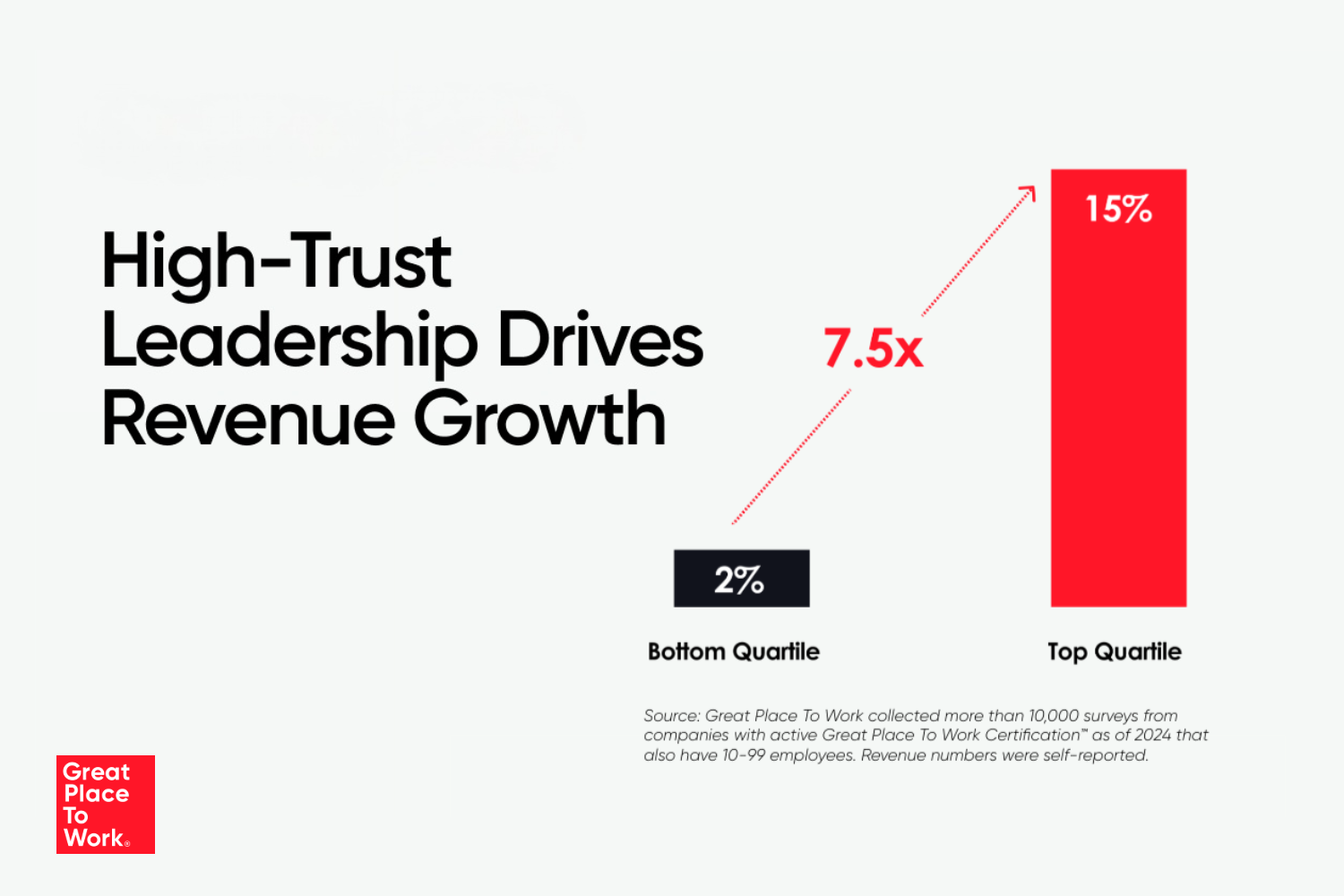The pharmaceutical company is one of the honorees on the Fortune 100 Best Companies to Work For Europe list in 2025.
Ever since spinning off from Abbott Laboratories in 2013, AbbVie has made culture a strategic business priority.
Why? “We think sustained performance will be driven by a consistent culture,” explains Jason Smith, senior vice president and head of Europe commercial operations at AbbVie.
AbbVie’s highly specialized work requires rigorous development and training, with an average tenure across Europe of nine years and some team members serving more than 20 years in their roles.
“So, we’re not looking for a one- or two-year view on financial performance; we’re looking for sustained performance,” Smith says. “If you do it not the ideal way, you may win for a quarter or a year, but you’re not going to sustain the performance. You’ll see people less engaged. You’ll see attrition.”
Mismanaging your team can create headaches that last longer than a couple of fiscal quarters. In just a few months, a poor manager can negatively impact a team with decades of collective service to the organization.
That’s why AbbVie is deeply passionate about its expectations for leaders, captured in its “Ways We Work” — five behaviors that guide continuous conversations about leadership and effective workplace norms — which are, in brief:
- All for One AbbVie. Everyone works together inclusively to pursue shared success.
- Decide Smart & Sure. Teams embrace ambiguity to make high-quality decisions quickly and ethically.
- Agile & Accountable. Everyone takes responsibility for results, good or bad.
- Clear & Courageous. Transparency and open communication ensure learning and improvement for all.
- Make Possibilities Real. Everyone commits to challenge the status quo in pursuit of excellence.

Most companies have values or leadership principles, but how the Ways We Work comes to life at AbbVie is one of the reasons it made the 2025 Fortune 100 Best Companies to Work For™ Europe List.
Leaders at AbbVie can expect these leadership behaviors to come up in performance reviews. “End of year reviews are equal parts business performance and behaviors,” Smith says.
Behaviors are measured through 360-degree reviews and employee surveys where data can be broken down by function to analyze the individual impact of people leaders.
“We look for trend variances year over year,” Smith says of employee survey analysis. “We compare to your peer group, but we also look very specifically at outliers where we have people leaders who are showing up more in the red on some of these behaviors.”
Where leaders have opportunities to improve on aspects of their leadership, they create actions plans, with progress measured over time.
As a result, 84% of AbbVie employees in Europe say managers show a sincere interest in their well-being and success. That’s 33 points higher than what is found at a typical company in Europe, where just 51% of employees say their manager shows a sincere interest in their lives, according to surveys from Great Place To Work®.
High levels of trust in leadership are rewarded with higher levels of discretionary effort and agility, key elements of success for any business. At AbbVie, 92% of employees give extra effort at work compared to just 59% of employees at a typical European workplace.
Maintaining a high-trust culture
These numbers aren’t academic for AbbVie. It has had to diversify the revenue once generated by its bestseller Humira which now faces increased competition from generics. A robust pipeline of new drug candidates is vital for growth — and in recent years AbbVie has heavily invested in acquisitions to add new candidates to its portfolio.
With an expanding workforce, several practices ensure that new leaders understand what is expected of managers.
“After somebody comes into a new role leading a team or an organization, you’ll have a facilitated discussion with their direct reports,” Smith shares. The conversation isn’t focused on business performance but instead investigates behaviors and culture.
“It’s your responsibility as a leader to take all of that and to not only act upon it, but to make sure you’re aware of it on an ongoing basis,” Smith says.
Another system of support is AbbVie’s culture ambassador program.
About 70 volunteers in Europe join colleagues from across the company to take on an advisory role, participating in a cross-functional Culture Summit and developing action plans to improve workplace practices within their local region. Being an ambassador is not for the faint of heart. “You have to be willing to invest in going back and challenging your leadership team at a local level,” Smith says.
Making culture a priority every day
The Ways We Work isn’t something that leaders talk about once a year during a culture event or at a performance review. “We want it to be embedded every week in the way you do business,” Smith says.
As an example, the team in Romania decided to focus on psychological safety.
“We found that there was quite a wide range of the spectrum in terms of people in teams really feeling like they could speak up and challenge their leader,” Smith says. For a pharmaceutical company, a lack of psychological safety can lead to less innovation, groupthink, and even systems failure.
The team had a series of discussions and trainings for leaders in the field, building awareness and skillsets. The result? An 8-point jump in measures of trust on the Great Place To Work survey for those employees.
Data is an invaluable resource for creating a high-performing workplace culture, Smith says. “Don’t just be negative but look for the outliers,” he advises. “Look for the areas of improvement and ask people about it.”
He shares his favorite question to ask employees as he travels from country to country across his portfolio in Europe: “If you have my job for a week, what are the two things you would change about AbbVie?”
The answers generate invaluable information to help guide his efforts to make AbbVie stronger and more resilient in a highly competitive market.
Get recognized for your culture
Gain accolades for your workplace environment and attract top talent who share your values.








